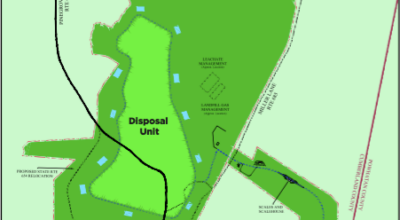Court order stops ACP construction
Published 5:02 pm Tuesday, December 11, 2018
The U.S. Court of Appeals for the Fourth Circuit granted a stay of implementation of the U.S. Fish and Wildlife Service’s (FWS) 2018 Biological Opinion and Incidental Take Statement Friday. Dominion Energy, one of the four major U.S. companies with the ACP, confirmed that all work is stopping on the pipeline except for activities in reference to public or environmental safety.
The stay, requested by petitioners Defenders of Wildlife, Sierra Club and Virginia Wilderness Committee was granted pending review by the court, according to documentation from the order filed Dec. 7 by the U.S. Court of Appeals for the Fourth Circuit.
According to the motion, provided by the court, the ACP construction would affect four endangered species, including Indiana Bats, Clubshell Mussels, Rusty-Patched Bumble Bees and Madison Cave Isopod.
The motion contended that the FWS, in two instances, “rushed its authorizations, introducing errors into its analysis, in order to accommodate Atlantic’s timeline.”
In a case argued in May, petitioners Defenders of Wildlife, Sierra Club and Virginia Wilderness Committee asked the court to seek review of the U.S. Fish and Wildlife Service’s Incidental Take Statement, which authorized the Atlantic Coast Pipeline project to take certain threatened or endangered species. To take, according to a definition by the U.S. Fish and Wildlife Service website, means to “harass, harm, pursue, hunt, shoot, wound, kill, trap, capture, or collect, or to attempt to engage in any such conduct.”
For five of the endangered species included within this authorization, a previous Herald report cited that “The three judge panel found the United States Fish and Wildlife Service’s Biological Opinion required to certify the Atlantic Coast Pipeline did not meet minimum legal standards.”
The Federal Energy Regulatory Commission (FERC) issued a stop-work order for the ACP on Aug. 10 citing a May 15 ruling by the United States Court of Appeals for the Fourth Circuit regarding the U.S. Fish and Wildlife Service reported failing to set clear limits on threatened or endangered species for the ACP, potentially violating a requirement by the Endangered Species Act.
According to the motion released Friday, this FERC ruling put pressure on FWS to “correct its analysis quickly.” FWS field staff, according to the motion, released proposed revisions by Sept. 5, allowing FERC to lift the stop work order Sept. 17.
These revisions, according to the motion, introduced new errors.
The motion argues that one revision exacerbated a 2017 statement about failing to address the full impact that clearing a majority of land used by Indiana bats would have on its population.
“FWS’s 2017 (Biological Opinion) BiOp determined that the ‘pipeline will adversely affect Indiana Bats by temporarily or permanently removing 4,448 acres of suitable habitat in the [Indiana bat] Recovery Unit.’”
The motion cited that of the 4,448 acres that would be removed, 3,275.382 acres are categorized as suitable unoccupied summer habitat, which would appear to be “unoccupied at the time of summer surveying.”
“FWS concluded that ‘the majority of effects to [Indiana bats] from tree clearing will occur in suitable unoccupied summer habitat,’” the motion cited. “FWS1-017784 (emphasis added). Clearing that habitat would cause ‘pregnant females [to] expend additional energy to seek alternate travel corridors,’ ‘which could decrease pup survival,’ and make bats‘more vulnerable to predation, resulting in injury or death.’”
The motion cited that the U.S. Court of Appeals for the Fourth Circuit vacated the 2017 Incidental Take Statement because it set a take limit at half of the acreage while also demonstrating the impact that removing half of the population would have on the bats.
“The 2018 BiOp and (Incidental Take Statement) ITS exacerbate this error,” the motion cited. “Instead of accounting for the missing half of suitable unoccupied summer habitat, FWS omitted the habitat altogether, deciding that clearing suitable unoccupied summer habitat is not likely to affect Indiana bats at all.”
The FWS’ 2018 BiOp and ITS states, according to the motion, “[E]ffects to [Indiana bats] from habitat clearing in the suitable unoccupied summer habitat category are ‘not likely to adversely affect’ and are not addressed further in this Opinion.”
According to the motion, Madison cave isopod are listed as being present in approximately 1,974 surface acres of the pipeline. The motion argues that without reasonable explanation, the FWS in 2017 limits the surface acres to 896.7 and 11.2 linear surface acres in 2018 without properly addressing the impact of the remaining acreage.
The motion also argues that the FWS used an erred analysis to determine Rusty-patched bumble bees populations can sustain some loss, populations which are considered on the verge of extinction.
“First, FWS’s 2017 and 2018 analyses are based on nest density information for a different species: the ‘common and abundant’ buff-tailed bumble bee,” the motion cited. “Using that information, FWS assumed a robust population of (Rusty-Patched Bumble Bees) RPBBs in the project area. The 2018 BiOp assumes there are 22 nests in the (High Potential Zone) HPZ; the 2017 BiOp assumed there were 27 nests within 0.8 km of the location where the single RPBB had been found … Based on that hypothetical, robust population, the 2018 BiOp asserts that loss of some RPBB nests and queens to pipeline construction is acceptable.”
Lastly, the motion argues that the Clubshell Mussel, also considered endangered, has 13 populations, with only seven reproducing. The FWS, according to the motion, presents evidence that officials in 2018 recovered 68 live clubshell from the monitoring location and now estimates as many as 94 are present at the Hackers Creek tributary in West Virginia, located along the ACP path. This could be potential evidence, according to the motion, that the population in that area is growing.
However, the motion argues that the FWS does not consider Hackers Creek a reproductive population.
Aaron Ruby, spokesperson with Dominion Energy, said the company has notified various agencies that the ACP is stopping all work until it hears back from the court, “except for activity needed to protect public safety and the environment.”
In response to the Friday decision, Ruby said the company is in the process of filing a motion for emergency clarification.
“We respectfully but strongly disagree with the court’s decision,” Ruby said. “We believe this stay is not only unwarranted, but overly broad. We are filing a motion for emergency clarification on the scope of the court’s decision. We do not believe there is any basis for the court to stay the entire Biological Opinion, which authorizes all 600 miles of the project. The issues in this case involve a much narrower scope of the project – only four species and roughly 100 miles in West Virginia and Virginia. We will have more clarity on the scope of the court’s stay and its impact on the project when the court responds to our motion.”
The U.S. Fish and Wildlife Service issued a new biological opinion in September that affirmed the project would not jeopardize the existence of more than half a dozen endangered or threatened species in its path. As a result of the biological opinion and after The National Park Service reissued a right of way permit to cross beneath the Blue Ridge Parkway between Augusta and Nelson counties, FERC lifted the stop work order in September.
“We believe the Fish & Wildlife Service thoroughly addressed the issues raised by the court and the petitioners in this case when it re-authorized the project’s Biological Opinion and Incidental Take Statement in September,” Ruby said. “In developing this project over the last four years, we have taken extraordinary care to protect the sensitive species at issue in this case. We will vigorously defend the agency’s re-authorizations and the measures we’ve taken to protect the species in oral arguments before the court early next year.”
The ACP is projected to span 600 miles, crossing Buckingham, Cumberland and Prince Edward counties. An air permit for a 53,783-horsepower compressor station in Buckingham has been rescheduled to be heard Dec. 19 at 10 a.m. The day and time was changed due to weather concerns related to Sunday’s winter storm and potential delayed opening of State offices in Richmond.





